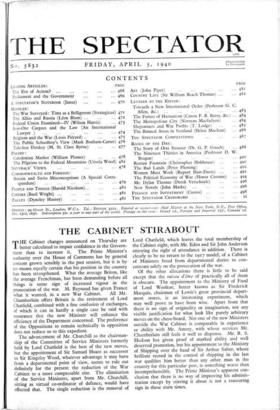THE CABINET STIRABOUT
90HE Cabinet changes announced on Thursday are I better calculated to impair confidence in the Govern- ment than to increase it. The Prime Minister's authority over the House of Commons has by general consent grown sensibly in the past session, but it is by no means equally certain that his position in the country has been strengthened. What the average Briton, like the average Frenchman, has been demanding before all things is some sign of increased vigour in the prosecution of the war. M. Reynaud has given France what it wanted, in a new War Cabinet. All Mr. Chamberlain offers Britain is the retirement of Lord Chatfield, combined with a fine confusion of exchanges, of which it can in hardly a single case be said with assurance that the new Minister will enhance the efficiency of the Department concerned. The preference of the Oppositions to remain technically in opposition does not reduce us to this expedient.
The advancement of Mr. Churchill to the chairman- ship of the Committee of Service Ministers formerly held by Lord Chatfield is the best of the new moves, but the appointment of Sir Samuel Hoare as successor to Sir Kingsley Wood, whatever advantage it may have from a departmental point of view, seems to rule out definitely for the present the reduction of the War Cabinet to a more compassable size. The elimination of the Service Ministers, apart from Mr. Churchill, sitting as virtual co-ordinator of defence, would have effected that. The single reduction is the removal of Lord Chatfield, which leaves the total membership of the Cabinet eight, with Mr. Eden and Sir John Anderson enjoying the right of attendance in addition. There is clearly to be no return to the 1917 model, of a Cabinet of Ministers freed from departmental duties to con- centrate solely on the prosecution of the war.
Of the other allocations there is little to be said except that the raison d'être of practically all of them is obscure. The appointment to the Ministry of Food of Lord Woolton, better known as Sir Frederick Marquis, chairman of Lewis's great provincial depart- ment stores, is an interesting experiment, which may well prove to have been wise. Apart from that there is no sign of originality or imagination, nor any visible justification for what look like purely arbitrary moves on the chess-board. Not one of the new Ministers outside the War Cabinet is comparable in experience or ability with Mr. Amery, with whose services Mr. Chamberlain still feels it well to dispense. Mr. R. S. Hudson has given proof of marked ability and well deserved promotion, but his appointment to the Ministry of Shipping over the head of Sir Arthur Salter, whose brilliant record in the control of shipping in the last war qualifies him better than any other man in the country for this particular post, is something worse than incomprehensible. The Prime Minister's apparent con- clusion that there is no way of improving his adminis- tration except by stirring it about is not a reassuring sign in these stern times.














































